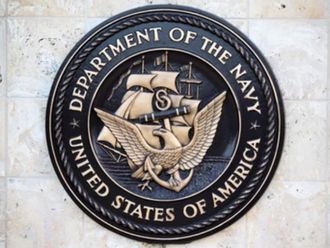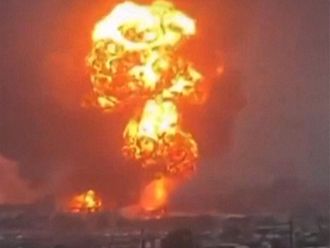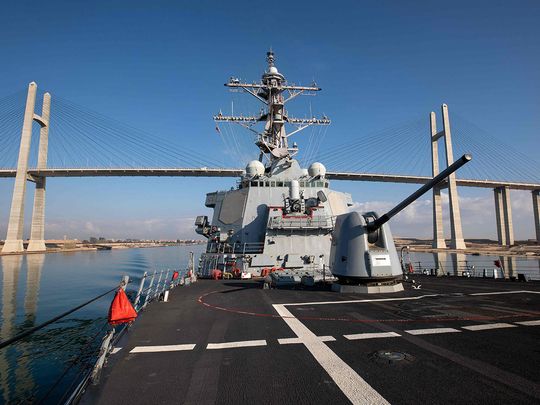
DUBAI: Defying the West, Yemen’s Al Houthis continued attacking vessels, firing missiles at a US destroyer and an American-owned cargo ship in the last 24 hours as more oil tanker owners stopped sending their ships through the waterway.
US fighter aircraft shot down a cruise missile fired from an Al Houthi militant area of Yemen toward USS Laboon in the southern Red Sea, an Arleigh Burke-class destroyer on Sunday, while an American-owned cargo ship was hit by a missile off the coast of Yemen on Monday in the International Recommended Transit Corridor, a passage of the Gulf of Aden.
According to Ambrey, a British maritime risk company, a fire broke out on board the Marshall Islands-flagged, US-owned bulk carrier, but it remains seaworthy and there were no injuries.
The latest attacks come after America and allied nations began strikes on Friday on the Iran-backed militants in Yemen following weeks of assaults on shipping in the Red Sea, heightening fears that Israel’s war with Palestinian Hamas militants could engulf the region. So far, at least 28 vessels have been attacked by Al Houthis since they seized the Israeli-linked Galaxy Leader vessel in November.
The first day of US-led strikes on Yemen on Friday hit 28 locations and struck more than 60 targets with cruise missiles and bombs launched by fighter jets, warships and a submarine. Sites hit included weapon depots, radars and command centres, including in remote mountain areas, the US has said. US forces followed up with a strike Saturday on an Al Houthi radar site.
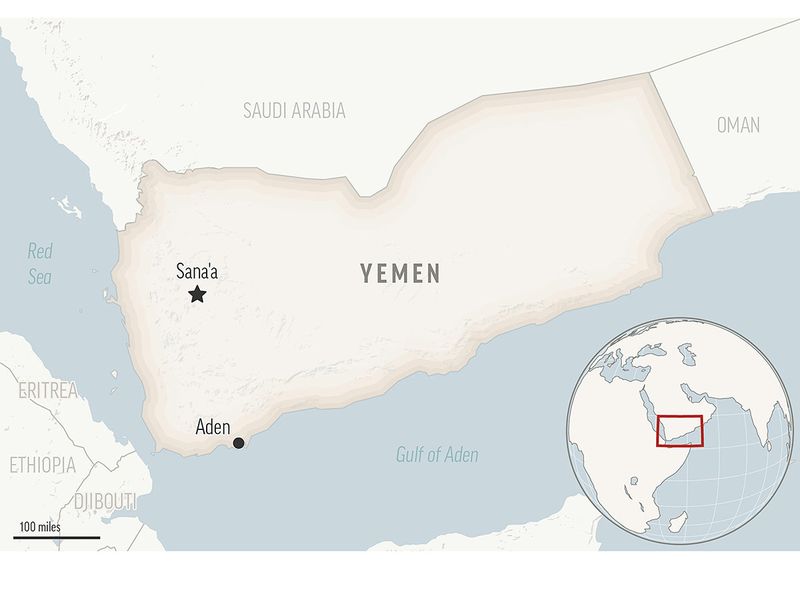
In fact, 40% of Asia-Europe trade normally goes through the area, including a huge amount of oil and diesel fuel for import-dependent Europe. So do food products like palm oil and grain and anything else brought over on container ships, which is most of the world’s manufactured products.
In all, about 30% of global container traffic and more than 1 million barrels of crude oil per day typically head through the Suez Canal, according to global freight booking platform Freightos Group.
HOW ARE HOUTHI ATTACKS AFFECTING TRADE?
Huge shipping container companies, including Maersk, are avoiding the Red Sea and sending their ships around Africa and the Cape of Good Hope. That adds a week to two weeks to voyages and increases costs for for shipping, fuel and more.
At least 90% of the container ships that had been going through the Suez Canal are now rerouting around the tip of Africa, said Simon Heaney, senior manager of container research for Drewry, a maritime research consultancy.
The cost to ship a standard 40-foot container from China to northern Europe has jumped from $1,500 to $4,000, according to the Kiel Institute for the World Economy in Germany. But that is still far from the $14,000 seen during the pandemic.
The delays contributed to a 1.3% decline in world trade in December, reflecting goods stuck on ships rather than being offloaded in port.
WHAT DOES IT MEAN FOR OIL PRICES?
Crude prices rose about 4% following the US-led airstrikes. International benchmark Brent traded at just over $80 per barrel Friday, still down from about $84 on the eve of the October 7 Hamas attack on Israel.
“While this puts upwards pressure on global oil prices, it is unlikely to represent a serious energy supply shock for now,” Simone Tagliapietra, an energy analyst at the Bruegel think tank in Brussels, tweeted.
That could change if the Hamas-Israel and Al Houthi conflicts escalate and lead to trouble at the Strait of Hormuz at the southern end of the Arabian Gulf, he said.
“That would have massive implications for global energy markets,” Tagliapietra said.
HOW IS THE WORLD RESPONDING?
The US is leading a security initiative to protect ships in the Red Sea that includes United Kingdom, Bahrain, Canada, France, Italy, Netherlands, Norway, Seychelles and Spain. Al Houthis have no navy to impose a cordon, relying on harassing fire and only one helicopter-borne assault so far.
Friday’s strikes killed at least five Al Houthi troops and wounded six, the rebels said, without elaborating on what was targeted. It was unclear how extensive the damage from the US strikes were, though the Houthis said at least five sites, including airfields, had been attacked. -- Reuters
The Al Houthis have targeted that crucial corridor linking Asian and Mideast energy and cargo shipments to the Suez Canal onward to Europe over the war, attacks that threaten to widen that conflict into a regional conflagration.
Following the strikes, the US-led Combined Maritime Forces (CMF) based in Bahrain warned all ships to avoid the Bab Al Mandab Strait at the south end of the Red Sea for several days on Friday, according to tanker body INTERTANKO.
Sunak to face parliament
In London, Prime Minister Rishi Sunak was due to face Parliament to explain why the UK joined the US in striking Al Houthi targets in Yemen — and why British lawmakers did not get a say on the military action.
Four Royal Air Force Typhoon jets took part in last week’s US-led strikes on sites used by the Al Houthis.
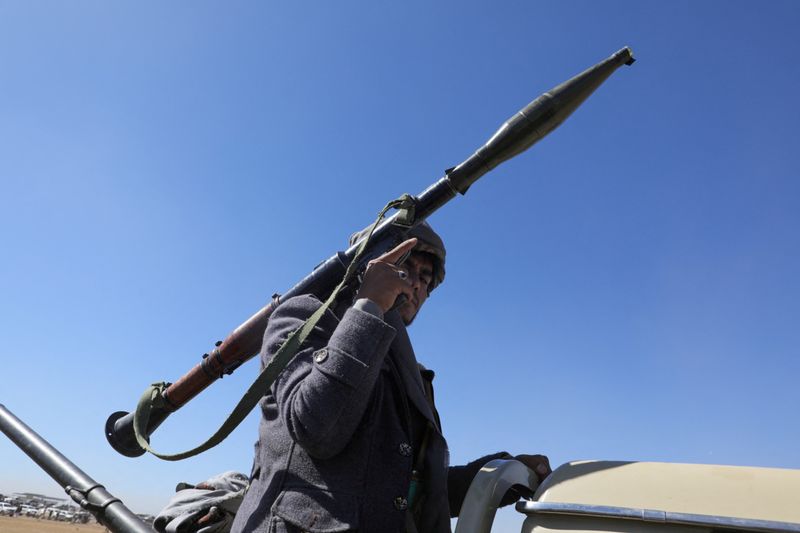
British Foreign Secretary David Cameron said the strikes by US and allied forces last week have gone “some way” toward degrading the Houthis’ capabilities, but that the UK is prepared to take action again if necessary.
The situation in the region had been deteriorating and Sunak was right to participate before telling lawmakers, he said.
“It’s hard to think of a time when there has been so much danger, and insecurity and instability in the world,” Cameron told Sky News on Sunday. “The lights are absolutely flashing red on the global dashboard.”
Since November, the Al Houthi militants, have repeatedly targeted ships in the Red Sea, saying they were avenging Israel’s offensive in Gaza against Hamas. But they have frequently targeted vessels with tenuous or no clear links to Israel, imperilling shipping in a key route for global trade.
Iran urges US, Britain to ‘stop war against Yemen’
Iran urged on Monday the United States and Britain to “stop the war against Yemen”.
“We warn America and Britain to stop the war against Yemen immediately,” said Iran’s Foreign Minister Hossein Amir-Abdollahian in a Tehran press conference.
He also called on the United States and Israel “to stop the war against Gaza” and said Al Houthis “will block Israeli ships or ships bound for Israeli ports” as long as the conflict continues.
Iran has previously called the strikes on Yemen “arbitrary” and a “violation” of international law.
Even the leader of the Lebanese militant Hezbollah group, Hassan Nasrallah, obliquely referenced the widening Al Houthi attacks on ships in a speech on Sunday, saying that “the sea has become a battlefield of missiles, drones and warships” and blaming the US strikes for escalating maritime tensions.
“The most dangerous thing is what the Americans did in the Red Sea, (it) will harm the security of all maritime navigation,” Nasrallah said.
Though the Biden administration and its allies have tried to calm tensions in the Middle East for weeks and prevent any wider conflict, the strikes in the Red Sea threaten to ignite one.
Qatar, meanwhile, appeared to have paused sending liquefied natural gas tankers through the Bab Al Mandab Strait after US-led airstrikes on Al Houthi targets.
At least five LNG vessels operated by Qatar that were heading toward the passage at the southern end of the Red Sea have been halted since Friday, according to ship-tracking data compiled by Bloomberg. -- With inputs from AP




